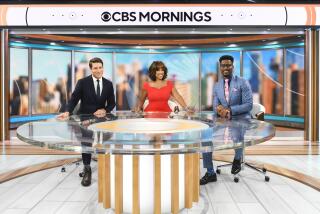BBC Tailors Its News Broadcast
- Share via
NEW YORK — It’s still the “BBC World News,” but now it’s coming to U.S. viewers from Washington, not just London.
The British Broadcasting Corp., having quietly expanded distribution of its nightly newscasts to almost the entire United States, last week started tailoring the programs to American viewers in a bid to attract an even wider audience.
The programs, available on public television stations and the BBC America cable and satellite channel, now air live from a Washington studio, and they lead with stories chosen based on their importance to American audiences. They are anchored by Mishal Husain, a Washington-based correspondent for the BBC.
Her low-key style--not even a necklace in sight on two recent nights--and the show’s straightforward graphics and reporting are in stark contrast to the flashier newscasts offered on the broadcast networks, cable news channels and even public TV’s “The News Hour With Jim Lehrer.” But the content marks the real difference from the U.S. alternatives: Monday’s show focused on international negotiations over Iraq, but it also looked at the killing of street children in Honduras and the Sri Lankan peace process.
Audience growth since the Sept. 11, 2001, terrorist attacks prompted the move to a Washington studio, said Husain, who was previously based in Singapore and London. “We want to build on that,” she said. It’s part of a long-term push to expand the BBC brand in the U.S., which may ultimately include challenging CNN and Fox News. BBC News Chief Executive Richard Sambrook said in a June speech to the National Press Club that he hopes one day BBC will offer a 24-hour news channel in the U.S., although BBC executives said even the multichannel broadband services are at or near capacity, so no such move is imminent.
BBC newscasts were first offered in the U.S. in November 1998, on just 14 public stations. They are now seen on 212 PBS stations, reaching 85% of U.S. TV viewers, as well as on BBC America, which is available in 30 million households. Word of mouth among the stations has spurred the steady expansion, said Terrel Cass, president and general manager of New York station WLIW, which distributes the show to public television. “It’s a foreign perspective on the news, and we don’t see that in the United States. If nothing else, it gives the USA a look at what the rest of the world thinks of us.”
Audience figures are sketchy, but WLIW says about 800,000 viewers tune in nationwide each night, compared to the nearly 30 million who watch one of the broadcast network newscasts.
Despite common wisdom that American viewers aren’t much interested in foreign news, there has always been a small, devoted audience for the international perspective. For five years, many public stations aired “World News for Public Television,” a taped newscast from London’s ITN, but it went off the air in the U.S. at the end of 2001, after it was unable to raise needed corporate underwriting in a difficult economic climate. That gave a boost to the BBC. Los Angeles’ KCET, for one, replaced the ITN newscast with the English-language “Journal” from Germany’s DeutscheWelle, then in July began airing “”BBC World News” at 5 p.m. It is also carried on Orange County’s KOCE at 6 p.m.
“Journal” often focused too much on German and European issues, said Douglas Chang, KCET director of programming, explaining the switch. Even so, some viewers preferred that to the BBC, which they feel is too close to an American perspective, he said, but the BBC reporting team has the advantage of being “almost unrivaled” in its presence around the world.
In Washington, D.C., BBC News at 7 p.m. has proven so popular that WHUT, Howard University’s station, in August added a second live BBC newscast, this one from London, at 10 p.m. In September, WHUT added a third daily live broadcast, at 7 a.m. After the 10 p.m. broadcast started, a grateful viewer sent a $200 donation, even though the station doesn’t solicit funds.
Last week’s move to make the program more American-friendly has been controversial with some public television stations. Cass said WLIW “did not encourage” the switch, fearing that the show might lose its foreign perspective.
“To the extent that it strengthens the traditional BBC core of international reporting, it’s a plus,” said Adam Clayton Powell III, general manager of Howard University Television. “But by no means should they try to make these news broadcasts more ‘American,’ because that would dilute their value. The value to us is, you are able to turn your TV set on ... just as if you were in a hotel room in London.” He said he’s thrilled when the program leads off with a story from places that CBS, ABC and NBC are unlikely to be.
But KCET’s Chang said the change could help ensure that the program puts world events into a context that Americans might not automatically have.
Husain, the show’s anchor, said that by being based in Washington, more guests can come into the studio, believing that face-to-face interviews are more illuminating than when a guest is merely talking to a camera. “There’s a different kind of debate and engagement with a guest sitting in the studio next to you,” she said. “It’s a better level of debate.”
She said the focus on international stories will remain, with reports from “places most American networks wouldn’t report from. We have correspondents around the world and we’ll draw on them as much as before.” But a U.S. presence, she said, will allow her “to key more into what is different for the American audience and draw out things of interest.”
More to Read
The biggest entertainment stories
Get our big stories about Hollywood, film, television, music, arts, culture and more right in your inbox as soon as they publish.
You may occasionally receive promotional content from the Los Angeles Times.










